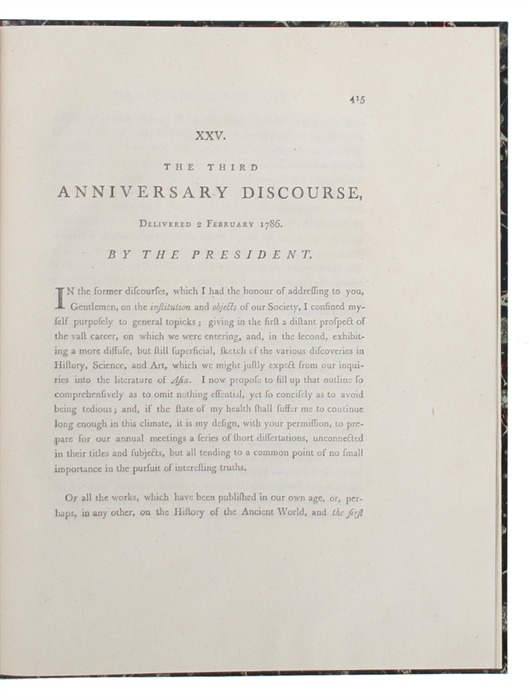FOUNDING COMPARATIVE PHILOLOGY - PMM 235
JONES, WILLIAM.
On the Hindu's. [In: Asiatic Researches or, Transaction of the Bengal Asiatic Society].
(Calcutta, Printed and sold by Manuel Cantopher, and sold at London by P. Elmsly, 1788).
4to. Extracted and bound in a recent vey nice marbled dark blue paper-binding w. matching gilt burgundy leather title-label to front board. A very nice and clean copy. Pp. 415-431
The seminal first edition of this groundbreaking paper which determined the connection between the Indo-European languages and thereby founded comparative philology and Indo-European studies. "This slim paper read to the Bengal Asiatic Society and published in its "Transaction" marks a turning-point in the history of linguistics and signaled the birth of comparative philology." (PMM 235).
Sir William Jones (1746-1794) was an English philologist and judge who was stationed in India in 1780. He is the founder of the Asiatic Society and now famous as the discoverer and propounder of the existence of a relationship between the Indo-European languages. As he was stationed in India, he set out to master the ancient Sanskrit language, among other things in order to study native Indian law codes, which were written in this language. Due to his excellent language skills and his already perfect mastering of Greek and Latin, Jones discovered a shocking similarity between the languages in a huge number of words. By this discovery of the connection between Latin, Greek and Sanskrit, Jones had, without realizing it initially, discovered what was to be known as proto-Indo-European, -the lost mother tongue of almost all European, Indian and Russian languages as well as some Middle Eastern ones. And thus, with this breakthrough work, Jones, for the first time in history, presents man with the fact that there exists one single, ancient, prehistoric language that led to the development of numerous languages in Europe, India, Russia and the Middle East. It was to take subsequent scholars almost a decade to uncover what exactly this language was, but because of Jones' founding of comparative philology, the likes of Karl Verner and Jakob Grimm have been able to do this.
The passage, for which Jones is most famous comes from the present work and has gone down in history as the single most important passage within the literature pertaining to comparative philology: "The Sanscrit language, whatever be its antiquity, is of a wonderful structure; more perfect than the Greek, more copious than the Latin, and more exquisitely refined than either, yet bearing to both of them a stronger affinity, both in the roots of verbs and the forms of grammar, than could possibly have been produced by accident; so strong indeed, that no philologer could examine them all three, without believing them to have sprung from some common source, which, perhaps, no longer exists; there is a similar reason, though not quite so forcible, for supposing that both the Gothic and the Celtic, though blended with a very different idiom, had the same origin with the Sanscrit; and the old Persian might be added to the same family." With these words, linguistics had witnessed a turning-point that was to change this science for ever and that was furthermore to point in the direction of a future understanding of the common heritage that much of mankind possesses.
"In 1786 Jones made his epoch-making discovery between the Sanskrit, Gothic, Greek and Latin languages -to which he later, erroneously, thought he could add Egyptian. His clear understanding of the basic principles of scientific linguistics provided the foundation on which Rask, Bopp and Grimm built the imposing structure of Indo-European studies." (PMM 235).
Order-nr.: 38098


![On the Hindu's. [In: Asiatic Researches or, Transaction of the Bengal Asiatic Society].](/images/product/38098b.jpg)